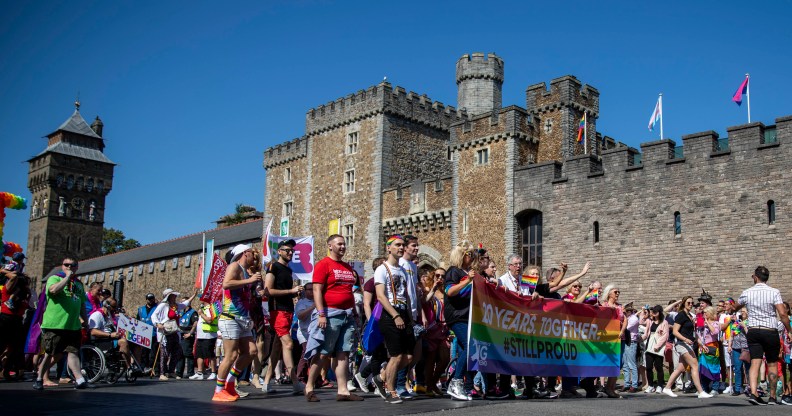Wales more welcoming and respectful of trans people than England, study suggests

An LGBTQ+ Pride parade in Cardiff, Wales. (Barcroft Media via Getty Images)
Around 80 per cent of people in Wales proudly hold a positive view towards the trans community, data released by the Equality and Human Rights Commission has found.
The public body, which campaigns for and enforces equality legislation in England and Wales, pulled figured from the British Social Attitudes survey to find that, across several issues, Welsh citizens tend to support trans rights more so than their English counterparts.
Around 76 per cent of people said that prejudice against transgender people was always or mostly wrong.
Moreover, people who describe themselves as not prejudiced towards trans folk rose to 84 per cent – two per cent up from 2016.
Views became more fractured across the border, the EHRC found. Around 56 per cent of Welsh respondents reported that they “respected” trans folk.
However within England, respect levels varied across various regions. At most, in the north and south of England, less than half said they “respect” trans people.
At the least, just 37 per cent in the West Midlands said they “respected” trans people, but researchers stressed that comparisons between regions in Britain should be “treated with caution” owing to small base sizes and diverse demographics not always captured.
Though the BSA survey included Scottish respondents, they were not asked to describe their feelings about trans people.
Stonewall welcomes ‘stable’ attitudes towards trans rights.
The head of Britain’s top LGBT+ rights charity Stonewall welcomed the survey, declaring them not only positive but “stable”, WalesOnline reported.
Stonewall UK’s Chief Executive Officer Nancy Kelley said: “High-level attitudes appear not only positive, but also stable.
“This means that this positivity is not new, nor is it fragile.”
Kelley stressed that negative attitudes towards trans people were likely sowed by the relentless transphobic news coverage, the touchstone being reform to the Gender Recognition Act which has been repeatedly delayed.
“There is some more concerning data, which suggests that in some areas, the public have become a little less inclusive in recent year,” she said.
“If our media coverage and social media discussions simply reflected this reality, the lives of trans people would be immeasurably improved overnight.
“Instead of this, the drip, drip of negative and distorted media coverage may be manufacturing a creeping sense of discomfort around shared spaces.”
Trans rights have, over the years, been positioned by anti-trans lobbies and lawmakers as a divisive issue within Britain, despite the fact that a vast majority of Britons support trans rights.
Pollsters have found support tends to splinter across several battle lines, such as what facilities trans people should have access to. Not surprising, say many LGBT+ rights advocacy groups, who have decried the ways in which trans rights have been contorted into a pinched culture war.
Indeed, the “debate” over the rights of one of the most marginalised and vulnerable groups in society has, activists warn, become dominated by cisgender lawmakers and pundits, whipped into frenzies by transphobic media coverage.

